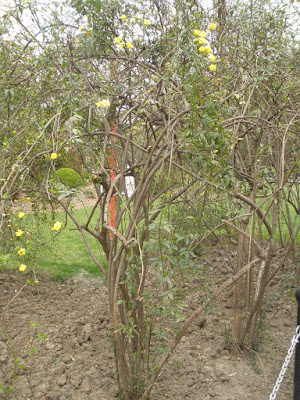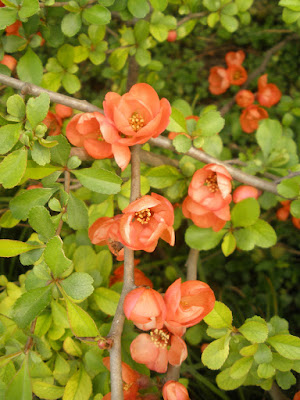Saturday, April 2, 2011 One of the 90-minute walks outlined in the Eyewitness Travel guide book takes place just a couple blocks from the Residence. We did half the walk this morning, starting out in an "antiques" market. It was really more of a flea market:
The bird and flower market no longer exists, but you could buy the cages with fancy water and food dishes:
We were so early, they were just setting up:
Lots of ceramics, figurines, old coins, brass items, etc.:
And the promised Mao-era memorabilia:An interesting detour into a Huaihai Park:
Landscaping with cherry trees in bud and mounding mondo grass:
Some new plants for us, Winter Jasmine:
Edgeworthia chrysantha/Paper Bush:
Flowering Quince:
Tulip or saucer magnolia:
Boxwood hedges and a boxwood tree:Then we heard the birds! They were in the trees in the park, but in little cages:
We later learned that the men bring their birds to the park to socialize and sing to each other, otherwise the birds forget how to sing:
The bird is a Chinese Hwamei - a type of song thrush.
This park also had exercise equipment, such as pulleys for arm and shoulder flexibility. Here we see the low- and high-tech methods used:
Ellipticals!
Balance:
Shikumen or stone-gate or stone tenement houses are unique to Shanghai. Many are built with grey granite and red bricks:
After the Taiping Revolution in the 1860s, there was an influx of refugees. Merchants were encouraged to invest in building housing for the potential workers. The "townhouses" were arranged along narrow lanes:
...often with decorative arches above the stone gates. In the area of Xintiandi, the shikumen were renovated and developed into a shopping, dining, and entertainment complex.
Xintiandi is also home to the Site of the First National Congress of the Communist Party of China. We visited the museum and saw life-size wax figures re-creating the First Congress where Mao Zedong was a dominant figure. The Museum was laid out very well and all labels were also in English. Admission was free, but you had to get a ticket first.
A photogenic fountain in Xintiandi:
The bronze sculptures were created by Wu Ching-ju, a Chinese-Dutch artist. They represent Prosperity:Longevity:
and Fortune:
While having lunch at the Paulaner Restaurant (German) in Xintiandi, we noticed a young man being photographed while another fellow held several bags and hangers with clothing:
A change of clothes:
Xintiandi is the place to see celebrities...
Another Starbucks:
Another Xintiandi fountain:
An Apple Store:
Leftover New Year's decorations in the trees?
Grass and plants growing on some porous and shaped substance:
From our residence, we can hear loudspeakers blaring from this stand - all afternoon!





































No comments:
Post a Comment